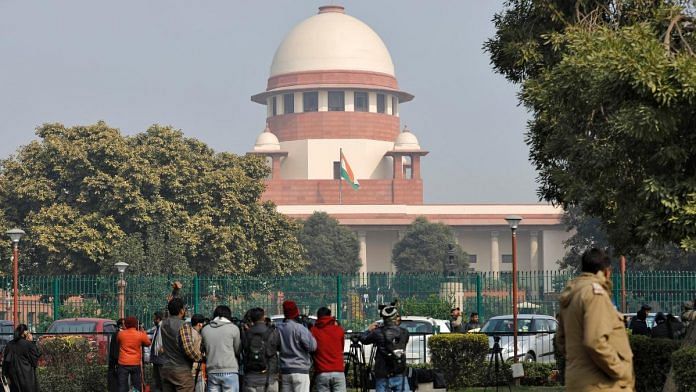New Delhi: The Supreme Court Thursday set out a new mechanism for the appointment of an Election Commissioner and ordered that the President shall do so on the advice of a committee comprising the Prime Minister, the Leader of Opposition in the Lok Sabha or the leader of largest opposition party and the Chief Justice of India (CJI).
A Constitution Bench led by Justice K. M. Joseph said that the Election Commission has to remain “aloof” from all forms of “subjugation by the executive” and that a “vulnerable Election Commission would result in an insidious situation and detract from its efficient functioning.”
The bench also said that the grounds for removal of the Election Commissioners should be the same as that of the Chief Election Commissioner.
With this direction, the top court ended the current system of appointment of poll panel commissioners. Till now the President used to appoint an Election Commissioner on the advice of the Council of Ministers.
This was as per Article 324 (2) of the Constitution that says that the President shall, with the aid and advice of the Council of Ministers, appoint the Chief Election Commissioner and the Election Commissioner, till Parliament enacts a law fixing the criteria for selection, conditions of service and tenure.
However, no law was enacted for the purposes so far. Pointed out to this anomaly, petitions were filed in the top court seeking a fair and transparent procedure for the appointment of the Chief Election Commissioner as well as the Election Commissioners.
Ruling on this PIL, the five-judge bench, also comprising justices Ajay Rastogi, Aniruddha Bose, Hrishikesh Roy and C.T. Ravikar, said the new system drawn out in its judgment shall remain enforced until a law is made in this regard by Parliament. The procedure underscored is similar to the current one that is followed to appoint a director of the Central Bureau of Investigation (CBI).
Justices Joseph and Rastogi authored concurring opinions on behalf of the bench.
Turning down the government’s objections to the petitions demanding reforms in the appointment process, Justice Joseph wrote: “Any process that seeks to improve the election process before this court must be considered.”
The Centre opposed the pleas on the ground that though the Constitution empowers the court to enact a statute, it cannot decide whether to enact a law on behalf of Parliament. Attorney General R. Venkataramani had also argued on behalf of the government that the reports referred by the petitioners in support of an amendment to the appointment process were vague and none of them go beyond asking for reforms.
In its judgment, the top court observed that many political parties had formed the government, but none framed a law, despite the Constitution making it an “unavoidable necessity.” The apex court termed this as a “lacuna” in the law.
It was emphasised that the poll panel was duty bound to act “in a fair and legal manner” and conform to the Constitutional mandate. “Democracy is inexplicable intertwined with power to the people. Democracy facilitates the peaceful revolution in the hands of a common man if held in a free and fair manner,” the court said.
Democracy can only succeed if there is purity in the election process and to achieve the same all stakeholders must work on it, it added. Commenting on the “unrelenting abuse” of the electoral process, the bench also came down on the media in the present times, remarking that it “has abdicated its role and become partisan.”
“The means to gain power in a democracy must remain pure and abide by the Constitution and the laws. The EC cannot claim to be independent then act in an unfair manner. A person in a state of obligation to the state cannot have an independent frame of mind. An independent person will not be servile to those in power,” the Supreme Court said, asserting the independence of the Election Commission.
(This story has been updated to reflect divergent views of four SC judges who refused to extend the protection enjoyed by the CEC to the Election Commissioners)
(Edited by Tony Rai)
Also Read: ‘Lack of understanding’, say ex-chief election commissioners after SC flags their short tenures



